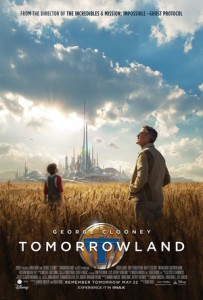 The world is going to end and you are going to die. That’s pretty much the message that Tomorrowland has to share. Not terribly upbeat, is it? Especially for a Disney movie, and one based on the area in Disneyland that was supposed to inspire hope and optimism about the future. Oh, don’t worry, it does have those elements as well, and in the grand tradition of fun, live-action Disney adventure flicks, it ends on a very happy, upbeat note. In fact, the whole film has a fun sense of adventure and optimism, but nevertheless, it’s all set against the back-drop of that uncontrivable fact: the world will end and you will die.
The world is going to end and you are going to die. That’s pretty much the message that Tomorrowland has to share. Not terribly upbeat, is it? Especially for a Disney movie, and one based on the area in Disneyland that was supposed to inspire hope and optimism about the future. Oh, don’t worry, it does have those elements as well, and in the grand tradition of fun, live-action Disney adventure flicks, it ends on a very happy, upbeat note. In fact, the whole film has a fun sense of adventure and optimism, but nevertheless, it’s all set against the back-drop of that uncontrivable fact: the world will end and you will die.
This is important because it’s true, and because it’s rare for a “family” film to deal with such important topics. Yet, Tomorrowland drops these very serious topics in the middle of a film that otherwise feels very much like Flight of the Navigator or The Rocketeer. While I certainly applaud the film for being willing to tackle such topics, I have to say it does get a little overly preachy about it, especially during the inevitable “here’s why all of this is happening” villain monologue. What could have been insightful commentary turned into straight up “let’s use this movie to tell everyone what we think.” Again, not that these topics shouldn’t be discussed, but showing instead of telling is often a better route to go, especially in a movie.
Fortunately, the movie doesn’t just dwell on the problem but also wants to help inspire a solution, and herein lies the problem. You see, while it’s easy to wrap our heads around the inevitability of the world ending, it’s much harder to find a solution that might fix that. It’s harder to find some reason to hope. Tomorrowland is supposed to be a place that could offer that hope, a place where people could be invited to help build a better future; but in order to get to that place, you needed an invitation, and a bridge to get there. Ultimately the film seems to suggest that what we need is to hope in hope, have faith in faith, and believe that somehow the very source of the problem, us, can also be its solution. While that may provide a comforting happy ending, it just isn’t practical, or possible.
Interestingly enough, the Bible tells a very similar story to Tomorrowland. The world is going to end, we are going to die, but there is a place of hope, of optimism, of eternal life. A place of freedom and joy, a place we’ve all been invited to, but need to find a bridge to get to. God himself has sent out those invitations simply because he loves us, and he wants us to enjoy a happy ending with him. He also provided a bridge, Jesus Christ. Jesus is the bridge that can take us from a doomed world to a world without end. Tomorrowland asks the interesting question of if you knew the world was going to end, what would you do? How would you prepare? If there was a way to not only escape the end, but also tell others that they could escape the inevitable, would you share that? Would you share the invitation? Would you tell them about the bridge? Would you? More importantly, would you accept that invitation? Would you cross that bridge regardless of if it was the only way? Would you?
So yes, Tomorrowland plays with some “big ideas”, but it also knows how to just play. 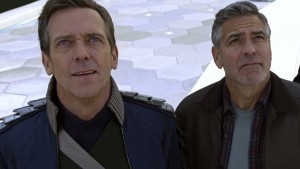 The action is fast and fun, though at times with a bit of an edge (not too edgy, though). The humor is light and playful, witty and smart, goofy and charming. The film inspires with visions of what the future could be (multi-level pools? Yes please!), and also tugs on the heartstrings. In shorts, it’s exactly what a Disney adventure film should be, and what they used to be back in Disney’s golden-age of live-action adventure flicks (a.k.a Swiss Family Robinson). Clooney is charming as a curmudgeon, Britt Robertson is fun as the spunky, upstart teen with a streak of optimism, and Raffey Cassidy is a profound joy as Athena. If there’s any let down in the cast, it’s Hugh Laurie, simply because is it used as much as he should have or his character developed as much as it needed to be. He was probably one of the most interesting characters, and sadly, one that we got to spend the least amount of time getting to know.
The action is fast and fun, though at times with a bit of an edge (not too edgy, though). The humor is light and playful, witty and smart, goofy and charming. The film inspires with visions of what the future could be (multi-level pools? Yes please!), and also tugs on the heartstrings. In shorts, it’s exactly what a Disney adventure film should be, and what they used to be back in Disney’s golden-age of live-action adventure flicks (a.k.a Swiss Family Robinson). Clooney is charming as a curmudgeon, Britt Robertson is fun as the spunky, upstart teen with a streak of optimism, and Raffey Cassidy is a profound joy as Athena. If there’s any let down in the cast, it’s Hugh Laurie, simply because is it used as much as he should have or his character developed as much as it needed to be. He was probably one of the most interesting characters, and sadly, one that we got to spend the least amount of time getting to know.
Yes, as you’d expect with anything Damon Lindelof has a hand in, there are some threads and questions that just don’t get answers. Fortunately most of these are minor and not on any sort of Prometheus scale. It was a pleasant surprise to see that many of the more important questions were addressed head on and resolved. Perhaps that credit needs to go to director Brad Bird, who also helped with the writing. Bird once again shows a deft hand at providing the thrills with the action but also the heart with his characters. Plus, this film has so many fun easter eggs that any fan of Disneyland or Brad Bird could easily get distracted spotting them all or making note of the clever call-outs.
Tomorrowland is one of those pleasant surprise movies that come along every now and then during the summer. It’s not a sequel, or a prequel, or a reboot, or remake; it’s that rare Hollywood creation – an original film. It’s also unique in that it’s upbeat, optimistic, light-hearted, and family friendly. When so many films seem to think “dark” and “gritty” are the keywords to success, it’s nice to have a movie that eschews all of that reminds us that’s okay for movie to just be fun and uplifting. No, Tomorrowland isn’t perfect, but it is earnest, and it is sincere. It’s also, quite simply, just a good time for the whole family.

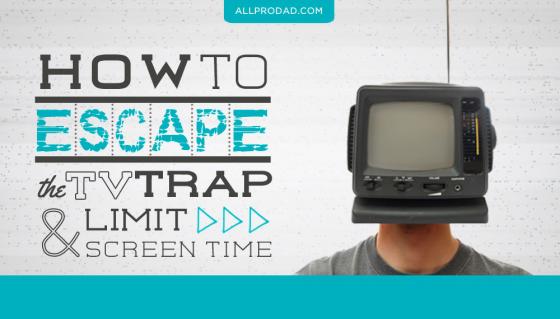
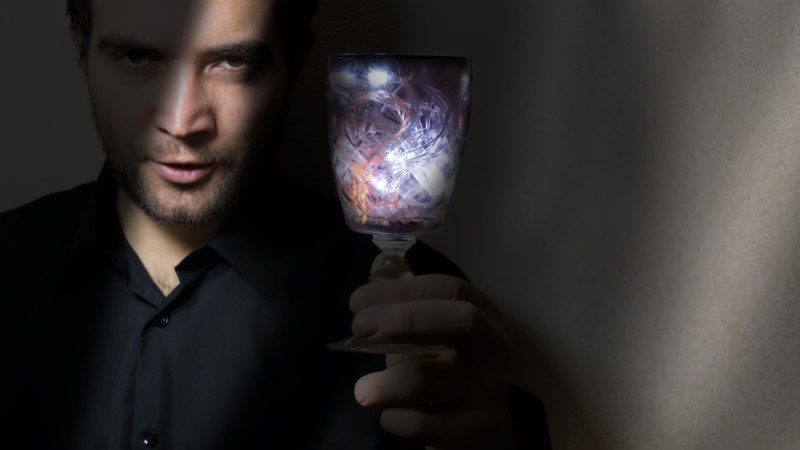

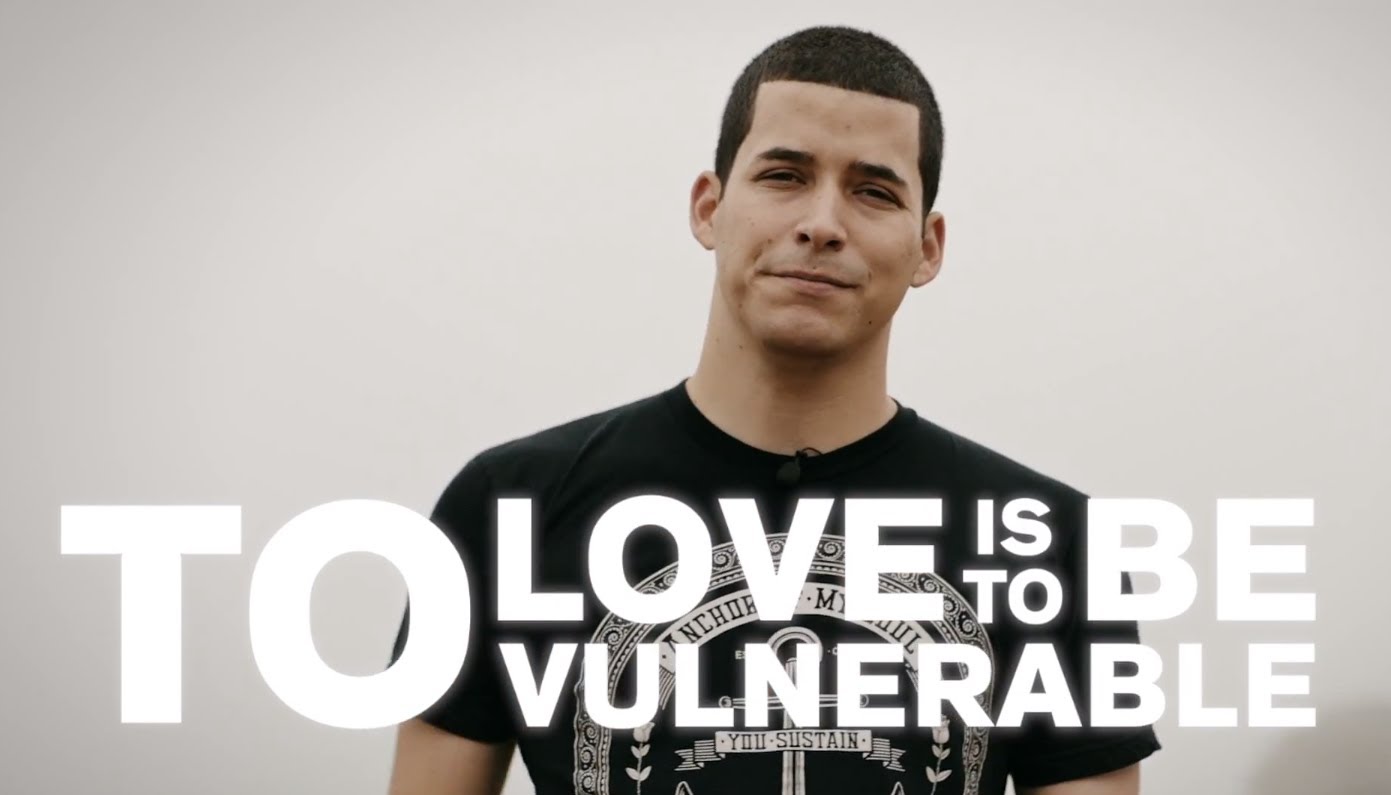
Actually, this film is a depiction of the sick minds of Hollywood. We must be very mindful that just because a movie has no cuss words nor explicit sex scenes, does NOT mean it is SPIRITUALLY clean. The movie is clear in depicting the society we live in….twisted minds….who emphasize the importance of machine and an unnatural love for inanimate objects without souls as opposed to fixing our broken hearts and mending them with Christ. A grown man was in love with a child machine….that is perversion and pedophilia at best and we must be careful to align the Word of Truth with the perversions of Disney and Hollywood and OPEN OUR EYES to what the modern day depravity of man tries to indoctrinate in our children. There is nothing innocent about that movie and there are a lot of clues about mind control and hints at the mark of the beast with those pins. It was disturbing to watch and the Holy Spirit was pointing out things to me left and right. We MUST get in our Bibles to be more sensitive to what is REALLY being depicted.